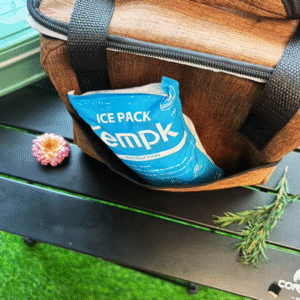Shipping temperature-sensitive products? A pack of 50 dry ice packs is your perfect solution. This article will explain how dry ice packs work, their benefits for cold chain logistics, and why they’re essential for the safe transit of perishable goods. Let’s explore how dry ice ensures your goods remain fresh, intact, and compliant with health regulations during shipping.
-
How do dry ice packs work and why are they essential for cold chain logistics?
-
What benefits does a pack of 50 dry ice packs offer your shipping process?
-
What are the best practices for using dry ice in shipping?
-
How do you choose the right dry ice packs for different shipment sizes?
-
Common challenges in using dry ice and how to solve them.
What Are Dry Ice Packs and How Do They Work?
Dry ice packs are solidified carbon dioxide that maintain an ultra-low temperature of -78.5°C. These packs help keep products frozen or chilled during transit. Dry ice sublimates, changing directly from solid to gas, ensuring no residue or liquid like with traditional ice, making it an ideal choice for shipping temperature-sensitive goods.
The Science Behind Dry Ice
Dry ice sublimates at -78.5°C, making it one of the most efficient cooling agents available. It provides a long-lasting cold source without the risks associated with regular ice, such as leakage. Dry ice packs are typically used in insulated shipping containers to maintain the required temperatures throughout transit.
| Feature | Description | Practical Significance |
|---|---|---|
| Low Temperature | Maintains sub-zero temperatures | Ensures perishable goods remain frozen |
| No Residue | Sublimates into gas, leaving no liquid | Safer for perishable goods, no mess |
| Cost-Effective | Long-lasting cooling power | Ideal for long-distance shipping, reducing costs |
Why Choose a Pack of 50 Dry Ice Packs for Your Cold Chain Shipping?
A pack of 50 dry ice packs offers flexibility and scalability, making it the ideal solution for businesses involved in shipping temperature-sensitive items like pharmaceuticals, biological samples, and perishable foods. Here’s why:
1. Reliable Temperature Control
A pack of 50 dry ice packs is perfect for keeping your goods within the required temperature range, whether you’re shipping small boxes or large containers. Their ability to maintain a steady sub-zero temperature reduces the risk of spoilage during long transit times.
2. Versatility for Different Shipment Sizes
Whether you’re shipping a small batch of products or a large shipment, a pack of 50 dry ice packs can be distributed across multiple shipments. This provides cost-effective and efficient temperature control regardless of the shipment size.
3. Minimized Spoilage Risk
Spoilage is a significant concern in cold chain logistics. Dry ice’s low temperature effectively reduces the risk of spoilage, ensuring that your products, such as food or medical supplies, arrive in optimal condition.
Best Practices for Using Dry Ice in Shipping
While dry ice is an excellent solution, it’s important to follow best practices to ensure safety and effectiveness:
1. Handle Dry Ice with Care
Always wear protective gloves when handling dry ice to prevent frostbite. Additionally, ensure your shipping containers are well-ventilated as dry ice sublimates into carbon dioxide, which can be dangerous in confined spaces.
2. Choose the Right Quantity
The amount of dry ice required depends on the shipping duration and container size. For medium to large shipments, a pack of 50 dry ice packs is typically sufficient, but always calculate the specific needs based on the shipment’s conditions.
3. Proper Packaging
Use insulated packaging like Styrofoam or Mylar bags to enhance the effectiveness of dry ice. Properly secure the dry ice inside the container to avoid shifting, ensuring consistent cooling throughout transit.
How to Choose the Right Dry Ice Packs for Your Shipments?
Choosing the right dry ice packs ensures that your products stay within the correct temperature range during transit. Here’s how to make the best choice:
1. Assess Shipment Size and Temperature Needs
For smaller shipments, fewer dry ice packs may suffice. However, for larger shipments, especially those requiring long-lasting freezing, a pack of 50 dry ice packs is ideal.
2. Consider Shipping Duration
Dry ice typically lasts between 18 to 24 hours, depending on the thickness and conditions. For longer shipments, you might need more dry ice or replenishments. Make sure to plan for the entire shipping time, including any delays.
3. Environmental Considerations
Be mindful of the shipping route and environmental factors such as weather. For shipments that travel through warmer climates or longer routes, additional insulation or dry ice may be necessary to maintain the internal temperature.
Common Challenges and Solutions When Shipping with Dry Ice
Despite its effectiveness, using dry ice comes with some challenges. Here’s how to overcome them:
1. Dry Ice Sublimates Over Time
Challenge: Dry ice will eventually lose its cooling power due to sublimation.
Solution: A pack of 50 dry ice packs is suitable for shipments up to 24 hours. For longer transit times, use additional dry ice and proper insulation to extend cooling duration.
2. Safety Concerns
Challenge: Dry ice can be hazardous if not handled properly.
Solution: Always use gloves and ensure adequate ventilation in the shipping container to avoid the risk of carbon dioxide buildup.
3. Cost Considerations
Challenge: Dry ice is more expensive than regular ice or gel packs.
Solution: While dry ice may have a higher upfront cost, it is more reliable and longer-lasting, which can reduce overall costs for businesses that require consistent cooling over extended distances.
2025 Cold Chain Logistics Trends and Innovations
The cold chain logistics industry is constantly evolving. Here are the latest trends shaping the future of shipping and refrigeration:
Eco-Friendly Dry Ice
Manufacturers are working on creating more sustainable dry ice, reducing its environmental impact. In response to increased demand for eco-friendly solutions, businesses are adopting these innovations.
Advanced Insulation Technology
New materials are being developed to extend the life of dry ice during long shipments, ensuring products remain frozen without the need for excessive dry ice.
Automated Dry Ice Management
Automated systems are being introduced to manage dry ice levels, ensuring efficient temperature control and reducing the chances of mishandling during large shipments.
FAQs
Q1: How long does a pack of 50 dry ice packs last?
Dry ice can maintain its cooling effect for 18 to 24 hours, depending on conditions. For longer journeys, use more dry ice or additional insulation.
Q2: Can I use dry ice for food shipping?
Yes, dry ice is safe for shipping food items, as long as proper safety precautions are followed, and the packaging is sealed correctly.
Conclusion and Recommendations
A pack of 50 dry ice packs is a game-changer for businesses involved in cold chain logistics. By understanding how to use dry ice effectively, choosing the right amount for your shipments, and following safety guidelines, you can ensure your perishable goods stay fresh and safe throughout transit.
Next Steps:
-
Plan your shipments: Calculate dry ice needs based on product size and transit time.
-
Follow safety protocols: Always handle dry ice with care and ensure proper ventilation.
-
Optimize your cold chain: Use high-quality insulation to extend cooling duration.
About Tempk
At Tempk, we specialize in providing top-tier cold chain logistics solutions tailored to your business’s needs. Our products, including dry ice packs, ensure optimal temperature control and secure shipping for perishable goods.
Ready to improve your cold chain logistics? Contact Tempk today for expert advice and the best dry ice solutions!
























